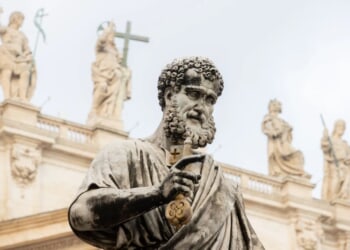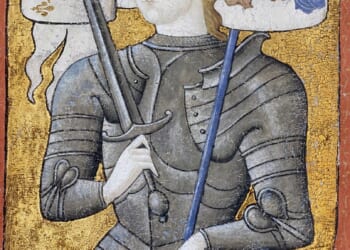St. Augustine (354-430) was not only a great thinker but a gifted writer whose pen could do justice to the precocious thoughts that were circulating in his mind. Because he was a great communicator, he had the knack of vesting his wisdom in bite-sized aphorisms. St. Augustine has become newsworthy, so to speak, because an Augustine, Pope Leo XIV, now sits on the Chair of Peter.
Most people are familiar with his most famous aphorism which appears in the first page of his Confessions: “Thou hast created us for Thyself, and our heart will not rest until it rests in Thee” (Fecisti nos ad Te, et in quietum est cor nostrum, donec requiescat in Te).
We are all restless to one degree or another. We try to overcome this restlessness by acquiring possessions, seeking pleasure, or pursuing honors. But in so doing, our restlessness only increases. We are restless because we are estranged from God. Its only cure is to be with the God who created us. Our hearts are made to be with God. Only in Him do we find repose.
Perhaps the second most familiar aphorism of Augustine is, “Love, and do what you will.” For the great Bishop of Hippo, love moves along a hierarchy from the lowest to the highest, which is God. As long as this order is preserved, love can do no wrong. Wherever there is love, there is an honoring of all things in their relation to God. Think of a railway that goes from San Francisco to New York. It does not matter the station from which you board the train, you still get to New York. Likewise, true love always puts you on the right track. We might also think of a train that remains in service if it accommodates but one passenger. Hence, Augustine states, “God loves each of us as if there were only one of us.”
Augustine has been called the world’s first existential thinker. He understands that the meaning of life is not restricted to the mind, but in our charitable deeds. “The words printed here are concepts. You must go through the experiences.” By the same token, love is not simply an idea but a stretching out to others. “What does love look like? It has the hands to help others. It has the feet to hasten to the poor and needy. It has eyes to see misery and want. It has the ears to hear the sighs and sorrows of men. That is what love looks like.”
Augustine has the heart of a poet. Everything he sees he sees as a miracle. “Miracles are not contrary to nature,” he writes, “but only contrary to what we know about nature.” And yet, man often fails to see the miracle that he is in himself. “Men go abroad to wonder at the heights of mountains, at the huge waves of the sea, at the long courses of the rivers, at the vast compass of the ocean, at the circular motions of the stars, and they pass by themselves without wondering.” “Know thyself,” continues to be elusive for human beings.
The most important virtue for Augustine is “humility, humility, and humility.” Here, he is not being redundant but emphatic. “Humility is the foundation of all the other virtues, hence, in the soul in which this virtue does not exist there cannot be any other virtue except in mere appearance.” And yet, for Augustine, “There is something in humility which strangely exalts the heart.” This makes sense because humility is truth, and with truth, we are free. We no longer must be troubled by illusions of who we are. With humility we are placed on the solid ground of reality.
Humility gives rise to all the other virtues. Thus, Augustine can say that “Love is the order of virtues.” The concept of order is essential to Augustine’s thinking. The wise person, the friend of God, orders his life to God and learns that “peace is the tranquility of order.”
Augustine is not without a strong sense of social justice. His instruction is as simple as it is wise: “Find out how much God has given you and from it take what you need; the remainder is needed by others.” In this regard, he is also very practical: “Since you cannot do good to all, you are to pay special attention to those who, by the accidents of time, or place, or circumstances, are brought into closer connection with you.”
Augustine has a wonderful way of blending theology with poetry. “O Holy Spirit, descend plentifully into my heart. Enlighten the dark corners of this neglected dwelling and scatter there Thy cheerful beams.” Concerning the eradication of vices, he writes, “We make ourselves a ladder out of our vices if we trample the vices themselves underfoot.”
As a good bishop, Augustine reminds his disciples that if we pray constantly, God will be working with us. Therefore, you should “pray as though everything depended on God. Work as though everything depended on you.” Augustine was ever mindful of the interplay between God and man. God, in His relationship with man expresses both His creativity and His courtesy: “He who created us without our help will not save us without our consent.” We can show our gratitude for our existence by serving Him on the path to our salvation.
As a Doctor of the Church, St. Aurelius Augustinus, because of his theological acumen, ranks second only to “The Man from Rocca Sicca.”
Image from Wikimedia Commons













